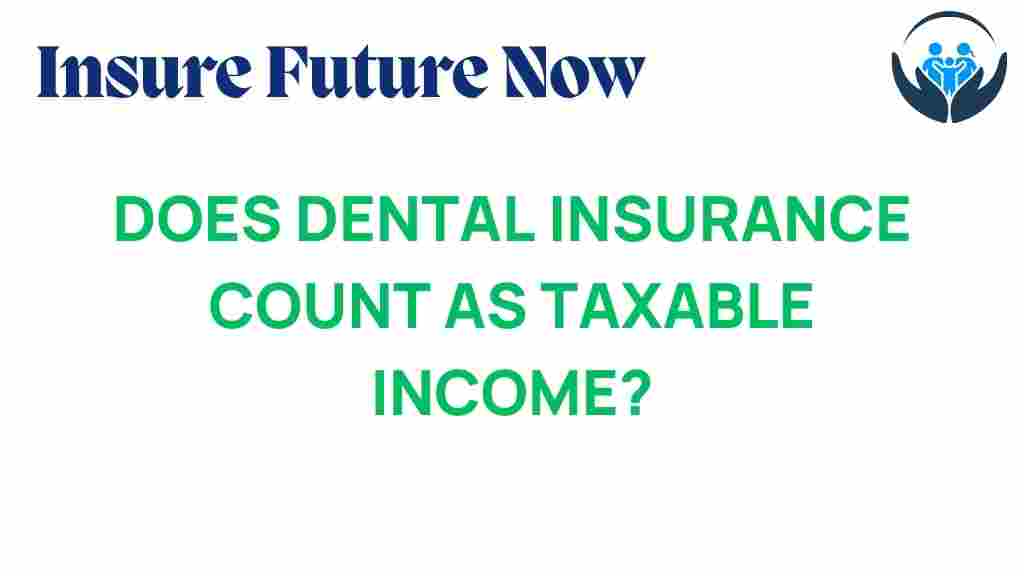Is Your Dental Insurance Taxable Income?
Understanding the intricacies of dental insurance and its implications on your taxable income can be a daunting task, especially as tax season approaches. Many individuals are left wondering whether the benefits they receive from their dental insurance affect their overall income tax obligations. This article will unpack the truth about the tax implications of dental insurance, helping you navigate the IRS guidelines and make informed decisions about your personal finance strategy.
Understanding Dental Insurance
Dental insurance is designed to assist policyholders in managing the costs associated with dental care. These plans often cover preventive services, such as cleanings and check-ups, as well as more extensive procedures like fillings, crowns, and even orthodontics. However, the specifics can vary significantly between different insurance providers and policy types.
The Basics of Taxable Income
Taxable income refers to the portion of your income that is subject to taxation by the IRS. This includes wages, interest, dividends, and certain benefits. It’s crucial to determine which income sources are taxable and which are not, to properly prepare your tax returns.
Tax Implications of Dental Insurance
When it comes to dental insurance, the question arises: are the benefits you receive considered taxable income? The short answer is no—generally, the benefits you receive from your dental insurance are not taxable income. However, there are nuances worth exploring.
IRS Guidelines on Dental Insurance Benefits
The IRS has established clear guidelines regarding what constitutes taxable income. According to IRS guidelines:
- Employer-Sponsored Plans: If your employer pays for your dental insurance, the premiums are typically not considered taxable income. This means you can enjoy the benefits without worrying about them impacting your taxable income.
- Health Savings Accounts (HSAs): Contributions to HSAs that are used for qualified dental expenses can be tax-deductible. Withdrawals for qualified medical expenses, including dental, are also tax-free.
- Flexible Spending Accounts (FSAs): Similar to HSAs, contributions to FSAs are made pre-tax, reducing your overall taxable income. However, any dental expenses paid through an FSA must qualify under IRS guidelines.
To better understand how these plans interact with your taxes, consider the following:
Benefits of Dental Insurance and Tax Considerations
While dental insurance benefits are generally not taxable, they do provide various advantages that can ease the financial burden of healthcare costs. Here are some key benefits:
- Coverage for preventive care, which can lead to cost savings in the long run.
- Lower out-of-pocket expenses for dental procedures.
- Tax-deductible contributions to HSAs and FSAs.
These benefits not only promote better dental health but also have positive implications for personal finance management.
Understanding Deductions and Healthcare Costs
As you prepare for tax season, it’s essential to understand how dental expenses can impact your overall tax situation. The IRS allows for certain deductions related to healthcare costs, including dental expenses. Here’s how you can leverage these deductions:
Qualifying for Medical Expense Deductions
To qualify for a deduction, your total medical expenses (including dental) must exceed 7.5% of your adjusted gross income (AGI). This means:
- Keep track of all your medical and dental expenses throughout the year.
- Include any out-of-pocket costs that are not reimbursed by your dental insurance.
- Document your expenses carefully, as you will need to provide this information when filing your taxes.
Once you’ve calculated your total medical expenses, you can deduct the amount that exceeds 7.5% of your AGI. This might provide significant tax savings, depending on your healthcare costs.
Step-by-Step Process for Filing Deductions
If you believe your dental expenses may qualify for deductions, follow these steps:
- Gather Documentation: Collect all invoices, receipts, and insurance statements that detail your dental expenses.
- Calculate Total Expenses: Add up all your qualified medical and dental expenses for the year.
- Determine Your AGI: Find your AGI using your tax return from the previous year as a reference.
- Calculate the Threshold: Multiply your AGI by 0.075 to determine the threshold for deductions.
- Subtract the Threshold: Subtract the threshold from your total medical expenses. The result is your deductible amount.
- File Your Taxes: Use the appropriate forms to file your taxes, ensuring you include your deductions.
By carefully following these steps, you can maximize your deductions and potentially reduce your overall tax burden.
Troubleshooting Common Issues
While navigating the tax implications of dental insurance, you may encounter some common issues. Here are troubleshooting tips to address these concerns:
1. Confusion About What Qualifies as a Deduction
Not all dental expenses are deductible. To qualify, they must be necessary and primarily for the prevention or alleviation of dental issues. Cosmetic procedures, such as teeth whitening, typically do not qualify.
2. Lack of Documentation
Always keep detailed records of your expenses. If you fail to document your expenses, you may miss out on potential deductions. Use file folders or digital tools to organize your receipts.
3. Misunderstanding Employer Contributions
If your employer contributes to your dental insurance premiums, remember that these contributions are generally not taxable. However, if you receive reimbursements for dental expenses from your employer, these may be considered taxable income.
4. Filing Errors
Double-check your tax forms for accuracy. Filing errors can lead to audits or missed deductions. Consider using tax software or consulting with a tax professional if you’re unsure.
Conclusion
In summary, understanding whether your dental insurance is considered taxable income requires a comprehensive look at IRS guidelines and personal finance management. Generally, the benefits from dental insurance are not taxable; however, navigating deductions and healthcare costs can provide additional financial benefits during tax season. By following the steps outlined in this article and staying organized, you can make informed decisions that positively impact your financial situation.
For more information on managing healthcare costs and maximizing your tax returns, check out this resource. If you still have questions about your specific situation, consider consulting a tax professional to ensure you’re making the most of your deductions.
This article is in the category Policies and created by InsureFutureNow Team
